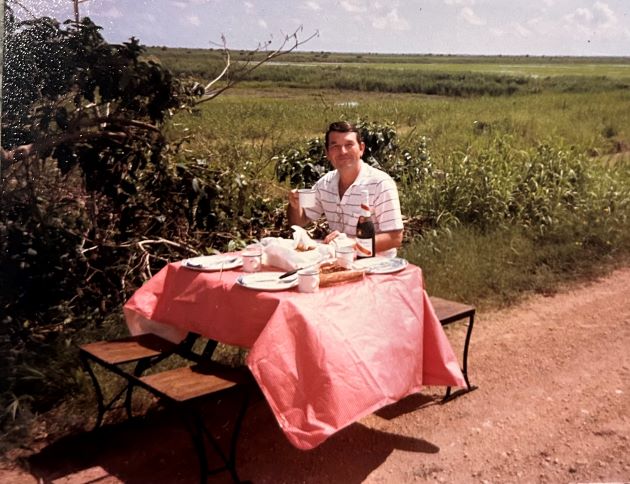The Pete I Knew
by Brett Fitzgerald, Executive Director, AAF brett@angleractionfoundation.org
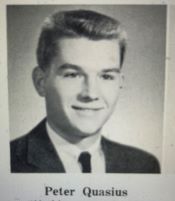 The Angler Action Foundation, several other conservation groups, his wonderful family and friends, and the entire state of Florida lost a giant on October 2, 2025. Captain Pete Quasius, graduate of Sheboygan High in ’58, Orvis fishing guide, mentor and friend to thousands, and so much more, left this world better than he found it many times over.
The Angler Action Foundation, several other conservation groups, his wonderful family and friends, and the entire state of Florida lost a giant on October 2, 2025. Captain Pete Quasius, graduate of Sheboygan High in ’58, Orvis fishing guide, mentor and friend to thousands, and so much more, left this world better than he found it many times over.
He will be greatly missed.
Before I knew Pete, he travelled the world in service to our country with the State Department including stops in Thailand, Vietnam, Burma, Pakistan, Austrailia and Guyana, which certainly played a role in honing his exceptional diplomatic skills.
Pete (with his wife Maria) and I met on the day we all started volunteering for the Angler Action Foundation, then known as the Snook Foundation. That was some 20+ years ago. At the time I knew very little about the complex workings of conservation in Florida. Pete was a masterful instructor to me (and many others). He took his time, patiently showing me the relationship between development, history, politics, hydrology and their unavoidable impacts on the ecology of Florida. The lessons never stopped.
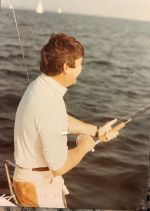 I am just one of many who benefitted, thankfully, because it is going to take an army of us to carry on his conservation dreams and legacy. There will never be another like him. If you knew him, that statement is as obvious as “I need to breathe if I want to live.”
I am just one of many who benefitted, thankfully, because it is going to take an army of us to carry on his conservation dreams and legacy. There will never be another like him. If you knew him, that statement is as obvious as “I need to breathe if I want to live.”
It would be impossible to wrap up Pete’s life as I knew it in a single book, let alone a web story. And I knew but a sliver of his life. Instead, what follows are a handful of lessons from him that struck me enough along the way that I bored my wife Megan with them, probably several times each. Maybe a bit of his wisdom will strike a note and help you think through issues and problems with a little more clarity and courage. Please indulge me, and read on:
Learn the difference between the perfect (unattainable), possible, and probable, and set your goals accordingly. This may have been one of his most consistent messages. Specifically when it came to Everglades Restoration, where Pete wielded incredible influence, he often pointed out that restoration to original flows is obviously impossible due to unreversible engineering of the entire watershed, whole cities popping up in sensitive areas, and numerous other reasons. That doesn’t mean all is lost, but it does mean we need to try to understand the very best we can realistically do moving forward. Conservation and restoration present continuously moving targets, it requires mental flexibility wrapped around unwavering goals of improving habitats and water quality to define and ensure long-term success.
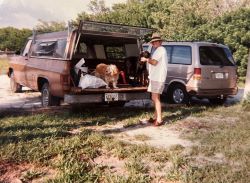 Never run away from different perspectives, instead embrace them. Pete always encouraged me to spend time with people who I disagree with, as well as people who come from different backgrounds and perspectives. Truly understanding how to best move forward with conservation means opening your mind to all possibilities, all realities, all opinions. It is increasingly hard to follow through with this lesson, as more and more of us consume news through mediums which cater to our personal views. That makes it tough to expand your mind. Pete’s solution seemed to be to spend face-to-face time with as many people as possible. “If I can help it, I never have lunch alone.” Every conversation was a learning opportunity. And though Pete was not a DEI guy for the sake of DEI, he encouraged inclusion because he knew there were perspectives that were important, which he simply could not conjure up without exposure to people and ideas of all backgrounds. And of course, he will always be correct about this.
Never run away from different perspectives, instead embrace them. Pete always encouraged me to spend time with people who I disagree with, as well as people who come from different backgrounds and perspectives. Truly understanding how to best move forward with conservation means opening your mind to all possibilities, all realities, all opinions. It is increasingly hard to follow through with this lesson, as more and more of us consume news through mediums which cater to our personal views. That makes it tough to expand your mind. Pete’s solution seemed to be to spend face-to-face time with as many people as possible. “If I can help it, I never have lunch alone.” Every conversation was a learning opportunity. And though Pete was not a DEI guy for the sake of DEI, he encouraged inclusion because he knew there were perspectives that were important, which he simply could not conjure up without exposure to people and ideas of all backgrounds. And of course, he will always be correct about this.
Taken a step further: When tackling an issue, especially one that requires a vote, accept temporary friends/alliances. Once a vote is cast, it counts regardless of who it came from. An early observation in my conservation career was how different conservation and environmental groups fought against each other. They might agree on 95% of the issues, and instead of working to move those issues forward as a unified front, they often seemed to hone on that 5%. So much time, money and energy is wasted splitting hairs over details while the greater goal drifts farther and farther away. Taken even further still, if a person or group is 95% in opposition to your goals but can help with a specific issue, be the better human, suck it up and make progress when and where you can. In 100 years, nobody will care who didn’t like who or why. But allowing our ecology to deteriorate is a sin that will follow generation to generation. Economics, quality of life, personal and community health – so much relies on a healthy ecology. Get over your personal issues, work with anyone who is willing to grab an oar and row. Disagree with them on other things later.
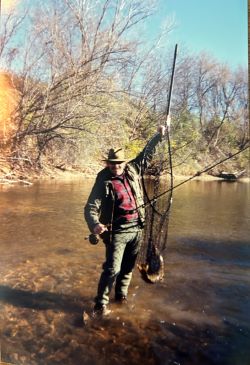 Yes, access is the key to future generations of conservation. But understand what access means. Pete’s passion for conservation grew from his personal experiences fishing, hunting, bird watching, boating, kayaking, camping, hiking, etc. Yes, we can learn about the environment by reading or watching videos. But developing the passion needed to protect it, with the energy and dedication truly required, only comes from personal experience. Pete also was quick to point out that ‘access’ does not mean allowing physical access to sensitive areas that would suffer from it, or allowing hunters/fishers to harvest excessively, or power boats to run through grass flats which need protection, etc. Access is something that is not a one-size fits all, but we need to ensure that we allow as much access as possible so future generations of folks like Pete are able to develop some of the passion that gripped his soul. It might feel like a double-edged sword, but as usual Pete hit the nail on the head here.
Yes, access is the key to future generations of conservation. But understand what access means. Pete’s passion for conservation grew from his personal experiences fishing, hunting, bird watching, boating, kayaking, camping, hiking, etc. Yes, we can learn about the environment by reading or watching videos. But developing the passion needed to protect it, with the energy and dedication truly required, only comes from personal experience. Pete also was quick to point out that ‘access’ does not mean allowing physical access to sensitive areas that would suffer from it, or allowing hunters/fishers to harvest excessively, or power boats to run through grass flats which need protection, etc. Access is something that is not a one-size fits all, but we need to ensure that we allow as much access as possible so future generations of folks like Pete are able to develop some of the passion that gripped his soul. It might feel like a double-edged sword, but as usual Pete hit the nail on the head here.
Don’t rely on emotion to fundraise, promote, or select restoration projects to suport. Emotion is fleeting. Good science might not be sexy in the moment but has long-term legs. You might get a temporary boost in support or funds by appealing to emotional extremes, but it simply is not sustainable. We humans live complex lives, and our emotions can only be divided so many ways, for so long. The emotional issue du jour is simply that. Once people have moved on to the next big thing, your issue will still be there. Further, allowing yourself to become emotionally attached to an issue will absolutely obscure your own sense of logical thinking, and ability to sustain long-term energy that is needed to tackle the many conservation needs of Florida. Pete was certainly an emotional man, he cared deeply for the environment. But he armored himself with knowledge. Nobody knew the details of the many ecological issues in Florida like Pete, and he thankfully shared them with anyone who would listen.
Your job isn’t done until you’ve found (and trained, if needed) your replacement. Possibly Pete’s only failure in the conservation world. Nobody but nobody can replace this man, and even Pete couldn’t recreate himself. I’ll do my small part as best I can, and I know others who Pete brought up through the ranks who will also carry the flag in his honor, bolstered by his teachings and leadership. The Angler Action Foundation and the Cypress Chapter of the Isaac Walton League are just two groups which have been shaped by Pete. We’ll both march on, knowing we are better in many ways because of Pete, hoping we learned enough to keep his vision alive. By the way, if you read the Eco-Voice Digest newsletter, you were able to gleen a bit of Pete's insights. Not flashy, not a massive readership. But content rich, and most people who were 'players' in Florida conservation followed Eco-Voice, and Pete sent that baby out every. single. night - for over 10 years.
The thousands of hours I have spent talking with Pete, either in person or phone calls at any given hour of the day or night, made me a better person. Every time I left from a visit with him, I felt equally that I have squandered much of my life, yet I could still accomplish anything. It was hard to avoid comparing my life to his – which is not a sensible exercise. Frankly, if Pete is the measuring stick, I could get an “A” for the rest of my life and still end up with a “C” average. Yet I know he has passed to me the tools that will give me ‘reasonable expectations for success’ (a common Pete mantra) in conservation endeavors and efforts.
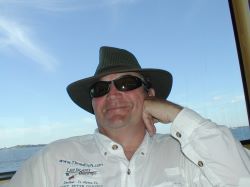 A final thought: Pete’s wife Maria served on our Board for over a decade. Her encouraging words frequently followed Pete’s directives/teachings/rants/etc. When in private, Pete also often talked about his daughter Leslie and her family. He also suffered through the loss of a son, Mark, to cancer.
A final thought: Pete’s wife Maria served on our Board for over a decade. Her encouraging words frequently followed Pete’s directives/teachings/rants/etc. When in private, Pete also often talked about his daughter Leslie and her family. He also suffered through the loss of a son, Mark, to cancer.
Pete’s time with me and the others he mentored, as well as the community leaders he spent hours with, came at his family’s expense as well as his own. As much as I wish for just one more conversation with him, I am fully aware of what they gave up, willingly or otherwise, so that I and others could benefit from his full attention. I ache for each of them. I can only hope they share some pride in just how many of us will continue his work. “Family first”, he said more and more frequently as time passed. That balance requires conscious thought, and I believe it is also a key ingredient of sustained success in any career.
The Pete I knew was truly legendary. I can’t be him, but I will be better because of him.
Love ya, Pete.
Onward.
